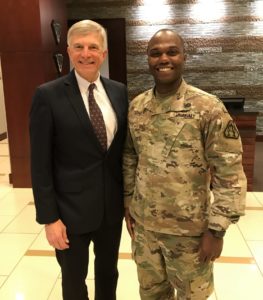Ron Sega is the U.S. military’s point person for speeding up its development and use of innovative technology.
On July 1, he will take a leave of absence as the Woodward Professor of Systems Engineering for a position as chief technology officer (CTO) for the U.S. Army Futures Command (AFC), headquarters in Austin, Texas.
The change marks Sega’s third career leave of absence to serve his country.

In 1990, he left a professor position at the University of Colorado-Colorado Springs to train to be an astronaut. He flew two missions into space on the space shuttle Discovery in 1994 and as payload commander for the third shuttle/Mir docking mission aboard Atlantis in 1996. In 2001, he took leave from his post as dean of CU’s College of Engineering and Applied Science to become director of Defense Research and Engineering for the U.S. secretary of defense, then under secretary of the Air Force.
At the Futures Command, he will support the Army’s R&D efforts to modernize cybersecurity, surveillance systems, hypersonics, autonomy, AI and other technological advancements.
“It’s needed,” Sega said. “National security for the United States is very important. It’s increasingly clear we need to get better in many of these areas, with a sense of urgency.”
Gen. John “Mike” Murray, commanding general for Army Futures Command said Sega is uniquely suited to serve as the CTO for AFC. “He is a prior Under Secretary of the Air Force, a former DoD chief technology officer, and served as one of America’s astronauts,” he said. “His advice, leadership, and expertise will prove critical as we work together to integrate technologies for our soldiers for years to come – I look forward to having him on the AFC team.”
Since Sega joined CSU in 2007, he has helped create the systems engineering program, growing the Masters and PhD programs in size and reputation. For 2019, the CSU Ph.D. in systems engineering is ranked No. 1 for online doctoral engineering degrees. The program, which applies multi-disciplinary solutions to complex problems, now has 131 doctoral students enrolled. Many are industry professionals.
“The systems engineering program is in a good place,” said Sega who will continue to advise graduate students while he’s working for the Army. “It’s aligned with the university’s core mission, and its future is very bright.”